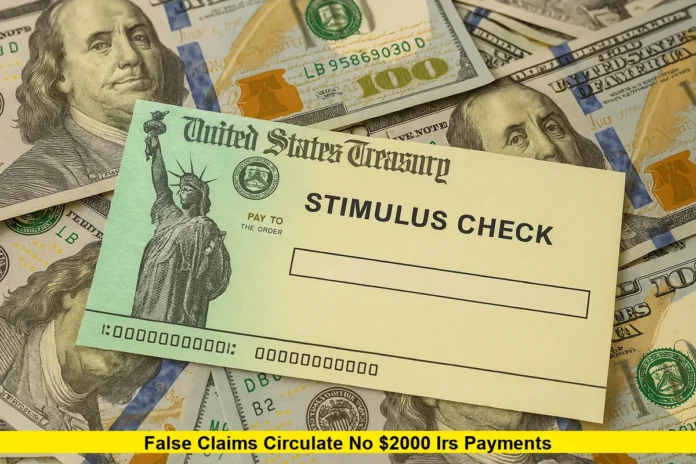Social media platforms have been buzzing with claims about incoming $2,000 direct deposits from the IRS scheduled for August 2025. These widespread rumors have captured public attention, but official sources paint a different picture entirely.
Official IRS Position Remains Clear
The Internal Revenue Service and U.S. Treasury Department have not confirmed any new round of stimulus checks, with claims of $2,000 payments in July or August 2025 remaining unsubstantiated by official government sources. The agency’s official newsroom contains no announcements regarding new economic impact payments for American citizens.
Recent IRS communications focus exclusively on existing programs and tax year updates. The most recent official announcement from August 7, 2025, addressed implementation of the One Big Beautiful Bill Act, specifically noting no changes to certain information returns or withholding tables for Tax Year 2025.
Congressional Action Required for New Payments
Federal stimulus payments require legislative approval through Congress. Neither the Internal Revenue Service nor Congress has confirmed any legislative action or proposal for additional federal payments. Without such authorization, the IRS cannot issue new economic relief payments to taxpayers.
The last federally-authorized stimulus payments occurred under the American Rescue Plan in 2021, providing up to $1,400 per eligible individual. These payments concluded the pandemic-era direct relief program.
What Legitimate IRS Payments Actually Exist
While new stimulus checks remain fictional, the IRS continues processing legitimate payments:
- Recovery Rebate Credits: The IRS announced special payments going to 1 million taxpayers who did not claim their 2021 Recovery Rebate Credit, with an April 15, 2025 deadline for filing.
- Regular Tax Refunds: Average refunds of $2,939 are being issued to eligible taxpayers as part of the regular IRS refund cycle, not as new stimulus initiatives.
- State-Level Programs: Some states continue offering targeted relief programs, though these vary significantly by location and eligibility criteria.
Social Media Misinformation Spreads Rapidly
Multiple websites and social media accounts have promoted these false claims with compelling headlines and detailed “eligibility requirements.” These sources often mimic legitimate news formats while providing no verifiable government backing.
The pattern typically includes specific payment dates, eligibility criteria, and direct deposit timelines. However, none cite official IRS documentation or Congressional legislation authorizing such payments.
How to Verify Legitimate IRS Information
Taxpayers seeking accurate information should consult only official sources:
The IRS website (irs.gov) remains the primary source for all agency announcements and payment programs. Official press releases appear in the agency’s newsroom section with proper documentation and legal backing.
Current analysis confirms no new federal stimulus checks are on the horizon, marking the end of pandemic-era direct relief. Any future economic impact payments would require significant legislative action and extensive public announcement through official channels.
State Programs Offer Limited Relief
While federal stimulus payments remain unavailable, some state-level programs continue providing targeted assistance. California’s initiative provides $725 monthly payments to 200 low-income families until November 2025, serving as a small pilot that could shape future universal basic income models.
These programs operate independently from federal initiatives and serve specific populations with limited scope and duration.
Red Flags in Fraudulent Claims
Legitimate IRS payments never require advance verification through unofficial channels. The agency does not request personal information via phone calls or emails regarding stimulus payments.
Websites promoting these false claims often include urgent language, specific payment dates without official backing, and requests for personal information. These tactics mirror common scam patterns designed to exploit public interest in financial relief.
Current Economic Context
The absence of new stimulus legislation reflects current economic conditions and political priorities. Federal spending on direct payments requires Congressional authorization, which has not materialized despite ongoing economic discussions.
Previous stimulus payments addressed specific crisis conditions, including unemployment spikes and business closures during the pandemic. Current economic indicators do not suggest similar emergency measures are under consideration.
Staying Informed on Tax Matters
Taxpayers should focus on legitimate opportunities for tax relief, including proper filing of previous year returns and claiming eligible credits. The IRS continues processing routine refunds and addressing legitimate taxpayer needs through established programs.
Future changes to tax policy or relief programs will receive extensive coverage through official channels before implementation. Social media rumors and unverified websites should not influence financial planning or expectations.
As misinformation continues circulating online, staying connected to official sources becomes increasingly important. Have you encountered these false claims on your social media feeds, and how do you verify financial information before believing it?
